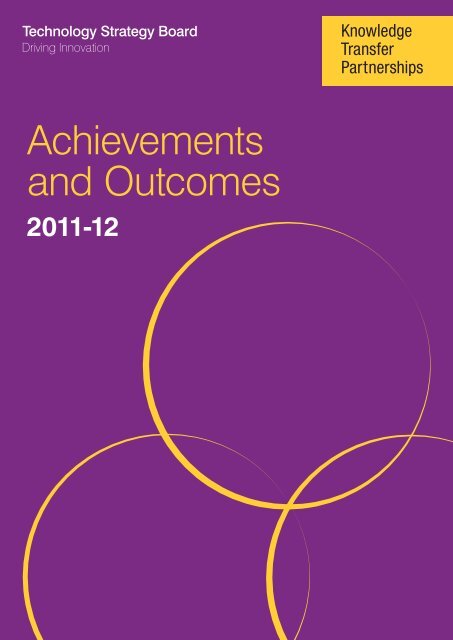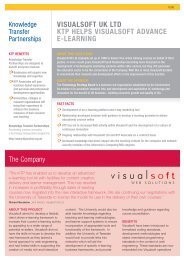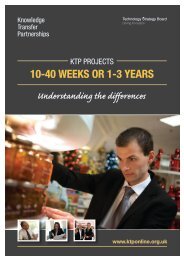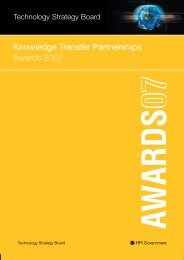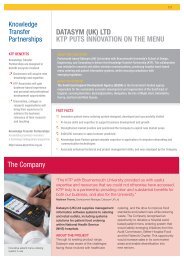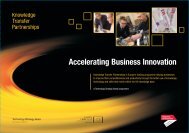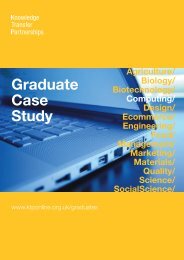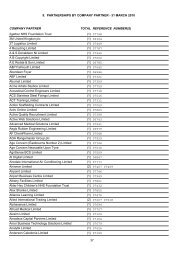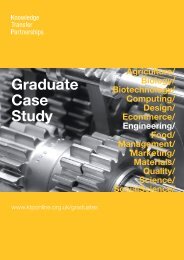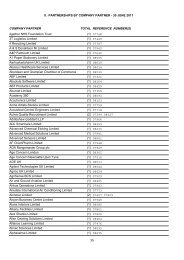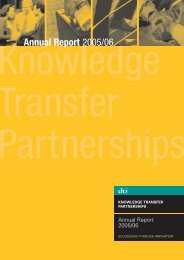Achievements and Outcomes - Knowledge Transfer Partnerships
Achievements and Outcomes - Knowledge Transfer Partnerships
Achievements and Outcomes - Knowledge Transfer Partnerships
Create successful ePaper yourself
Turn your PDF publications into a flip-book with our unique Google optimized e-Paper software.
Technology Strategy Board<br />
Driving Innovation<br />
<strong>Achievements</strong><br />
<strong>and</strong> <strong>Outcomes</strong><br />
2011-12
<strong>Knowledge</strong> <strong>Transfer</strong> <strong>Partnerships</strong><br />
<strong>Knowledge</strong> <strong>Transfer</strong> <strong>Partnerships</strong> (KTP) is Europe’s<br />
leading programme helping businesses to improve their<br />
competitiveness, productivity <strong>and</strong> performance through<br />
the better use of the knowledge, technology <strong>and</strong> skills<br />
that are available within the UK knowledge base.<br />
About KTP <strong>and</strong> its funders<br />
A KTP is a three-way partnership between<br />
a business, UK university or college <strong>and</strong> a<br />
recently qualified graduate, known as the<br />
associate. It offers a company the chance<br />
to collaborate on a business opportunity,<br />
idea or innovation. We part-fund the cost<br />
of the project, including the KTP associate,<br />
who helps the business gain the<br />
knowledge <strong>and</strong> capability it needs to<br />
innovate <strong>and</strong> grow. KTPs can come from<br />
any sector or industry – from satellite<br />
technology <strong>and</strong> the creative industries<br />
through to high-value manufacturing <strong>and</strong><br />
environmental technologies. <strong>Partnerships</strong><br />
can last from six months to three years.<br />
Partners within a KTP can generally be<br />
classified in the following way:<br />
knowledge base partners include<br />
higher <strong>and</strong> further education<br />
institutions, research <strong>and</strong> technology<br />
organisations, <strong>and</strong> public sector<br />
research institutions<br />
associates can be recently qualified<br />
university graduates (bachelors,<br />
masters or PhD), people who have<br />
completed post-doctoral research or<br />
individuals recently qualified to at least<br />
NVQ level 4 or equivalent<br />
businesses or organisations, including<br />
public <strong>and</strong> third sector organisations,<br />
can be any size, from any sector <strong>and</strong><br />
from any region of the UK.<br />
KTP builds sustainable capacity <strong>and</strong><br />
capability to innovate in businesses which<br />
do not already have the ability to engage in<br />
successful open innovation (with academia),<br />
in particular for businesses that:<br />
need to develop their capability<br />
to transform the business for new<br />
growth opportunities, or<br />
are new to open innovation, have<br />
the potential to innovate but currently<br />
lack the necessary managerial skills<br />
<strong>and</strong> expertise, or<br />
lack the technical knowledge to<br />
exploit external resources from the<br />
knowledge base.<br />
The programme is UK-wide, headed<br />
by the Technology Strategy Board <strong>and</strong><br />
supported by 12 other public sector<br />
funding organisations on an ongoing<br />
basis. The eligibility of any individual<br />
organisation to participate in KTP is<br />
determined by the funding organisations’<br />
criteria for support.<br />
02 | Technology Strategy Board
<strong>Achievements</strong> <strong>and</strong> <strong>Outcomes</strong> | Impact Report 2011-12<br />
Contents<br />
About KTP <strong>and</strong> its funders 02<br />
Contents 03<br />
Introduction 04<br />
Overview 05<br />
KTP across the UK 06<br />
<strong>Outcomes</strong> <strong>and</strong> benefits for businesses 08<br />
Projects by company size 10<br />
<strong>Outcomes</strong> <strong>and</strong> benefits for the knowledge base 12<br />
<strong>Outcomes</strong> <strong>and</strong> benefits for the associate 14<br />
Funding 16<br />
KTP Best of the Best Awards - October 2011 17<br />
KTP Assessor Panel 18<br />
Technology Strategy Board | 03
<strong>Knowledge</strong> <strong>Transfer</strong> <strong>Partnerships</strong><br />
The <strong>Knowledge</strong> <strong>Transfer</strong> Partnership programme has been<br />
operating for more than 37 years, enabling UK businesses<br />
of all sizes to take advantage of the expertise available<br />
throughout the UK knowledge base of education <strong>and</strong> research<br />
institutions. After all this time, the KTP programme continues<br />
to be the leading knowledge transfer programme in Europe.<br />
Introduction<br />
In 2011-12 KTP supported UK business<br />
by drawing on the expertise of more than<br />
100 higher education institutions across<br />
over 400 departments.<br />
From an investment of £34m of<br />
government funding last year, businesses<br />
reported:<br />
changes in anticipated annual profits<br />
of £163m<br />
employment of over 1,300 new staff<br />
increases of £145m in annual exports<br />
investments of £93m in plant <strong>and</strong><br />
machinery / research <strong>and</strong> development.<br />
All of this demonstrates the ongoing<br />
benefits to the UK of the KTP programme.<br />
There were also some exciting changes<br />
to KTP during 2011-12, including the<br />
introduction of some new funders, as well<br />
as KTP themed competition calls to help<br />
support <strong>and</strong> complement the ongoing<br />
activity of supporting projects defined<br />
by business need regardless of sector or<br />
theme. The Technology Strategy Board<br />
provided additional funding from its<br />
innovation programme to support eight<br />
KTPs that were selected as a cohort<br />
for the first themed call relating to<br />
‘Parallel <strong>and</strong> MultiCore Processing’.<br />
The shorter KTP scheme was also<br />
re-opened in September 2011 for projects<br />
with a duration of six months to 51 weeks.<br />
The Technology Strategy Board is<br />
continuing its strong commitment to the<br />
KTP programme as an integral part of its<br />
portfolio of programmes to help <strong>and</strong><br />
support business innovation. Once again,<br />
I must thank our funding partners for their<br />
continued support <strong>and</strong> commitment to<br />
the programme <strong>and</strong> we are very pleased<br />
to welcome aboard some new funders<br />
which include the Medical Research<br />
Council who are providing funding for the<br />
core KTP programme, <strong>and</strong> the Nuclear<br />
Decommissioning Authority who confirmed<br />
their support for the Civil Nuclear Power<br />
Supply Chain themed call opened at the<br />
end of the year.<br />
In summary, during the 2011-12 financial<br />
year, almost £58m was committed to<br />
new KTP partnerships in the shape of<br />
grant support <strong>and</strong> company contributions.<br />
At the end of the year, our portfolio<br />
comprised 848 KTP partnerships<br />
(792 classic <strong>and</strong> 56 shorter partnerships)<br />
facilitating the exchange of knowledge<br />
between the UK knowledge base <strong>and</strong><br />
businesses of many differing sizes <strong>and</strong><br />
from various sectors.<br />
Iain Gray, Chief Executive<br />
Technology Strategy Board<br />
04 | Technology Strategy Board
<strong>Achievements</strong> <strong>and</strong> <strong>Outcomes</strong> | Impact Report 2011-12<br />
As a result of the Government<br />
money committed to <strong>Knowledge</strong><br />
<strong>Transfer</strong> <strong>Partnerships</strong> during<br />
2011-12, UK businesses looked to<br />
benefit from a projected £163m<br />
increase in their annual profit, with<br />
over 1,300 new jobs created<br />
<strong>and</strong> 9,500 company staff trained.<br />
Overview<br />
Effect of government funding<br />
Put another way, for every £1m of Government money invested:<br />
39 new jobs were created (including associates employed after their project completed)<br />
279 staff were trained<br />
£1.53m was invested in plant <strong>and</strong> machinery<br />
<strong>and</strong> £1.2m was invested in R&D.<br />
The one-off increase in profit before tax dropped to £0.48m from £0.9m last year, but<br />
the anticipated annual increase in profit increased to £4.79m (from £3.08m in 2010-11).<br />
Benefits for the<br />
Business Partner<br />
With such a wide range of KTP projects,<br />
the business outputs can vary<br />
considerably, but the average business<br />
benefits for a project may include:<br />
an increase of more than £365k in<br />
annual profits before tax<br />
the creation of three new jobs, in<br />
addition to recruitment of the associate<br />
an additional 21 staff trained.<br />
Benefits for the<br />
<strong>Knowledge</strong> Base<br />
Academics working on KTP projects are<br />
typically able to:<br />
develop business-related teaching<br />
materials<br />
initiate at least three new research<br />
projects <strong>and</strong> publish high-quality<br />
research papers<br />
identify undergraduate or post-graduate<br />
projects<br />
contribute to the Research Excellence<br />
Framework exercise (REF).<br />
Benefits for the<br />
Associate<br />
As one of the country’s largest graduate<br />
recruitment schemes, KTP continues<br />
to enhance associate career prospects<br />
in the following ways:<br />
it provides an opportunity to manage<br />
a challenging project that is central to<br />
the business’s strategic development<br />
73% of associates are offered<br />
employment by the host business on<br />
completion of their project<br />
KTP is a recognised route to fast-track<br />
career development.<br />
Technology Strategy Board | 05
<strong>Knowledge</strong> <strong>Transfer</strong> <strong>Partnerships</strong><br />
1,083 total projects – April 2011<br />
Since then:<br />
434 projects completed<br />
222 offer letters issued for classic KTPs<br />
<br />
845 total projects – March 2012<br />
KTP across the UK<br />
The following map provides a useful<br />
visual breakdown of projects throughout<br />
the UK <strong>and</strong> shows how the numbers<br />
<strong>and</strong> distribution of projects has remained<br />
broadly consistent.<br />
Size of portfolio<br />
Following a peak in 2010 of 1,200 classic<br />
KTP projects, prior to the spending review,<br />
the size of the portfolio has continued to<br />
decrease over 2011-12, bringing the<br />
portfolio down to a revised target of<br />
around 800 classic projects by the end<br />
of the year as shown in figure 1.<br />
Funding commitment<br />
Funding levels remained high, reflecting<br />
the positive level of commitment to<br />
KTPs already in existence from our<br />
funders. Funders spent a total of £32m<br />
in the year in terms of grant expenditure<br />
<strong>and</strong> committed a further £17m to new<br />
partnerships approved in the period<br />
2011-12.<br />
Exceeding expectations<br />
A total of 428 partnerships were completed<br />
in the year. Upon completion, the<br />
partnerships must submit a final report<br />
which is graded by an independent KTP<br />
assessor panel. To be awarded the highest<br />
grade, a partnership must have achieved<br />
the required outcomes (detailed in their<br />
final report) as well as demonstrating that<br />
Key<br />
March 2011<br />
March 2012<br />
Scotl<strong>and</strong><br />
10% 12%<br />
Northern Irel<strong>and</strong><br />
5% 6%<br />
South West<br />
9% 8%<br />
North West<br />
10% 10%<br />
West Midl<strong>and</strong>s<br />
11% 10%<br />
Wales<br />
7% 8%<br />
Engl<strong>and</strong><br />
78% 74%<br />
North East<br />
5% 6%<br />
Yorkshire &<br />
the Humber<br />
9% 10%<br />
East Midl<strong>and</strong>s<br />
7% 7%<br />
5% 3%<br />
London<br />
8% 7%<br />
East<br />
South East<br />
14% 13%<br />
06 | Technology Strategy Board
<strong>Achievements</strong> <strong>and</strong> <strong>Outcomes</strong> | Impact Report 2011-12<br />
they have exceeded the original objectives<br />
of the project for all three partners. Of the<br />
partnerships whose final reports were<br />
graded by year end, 54% were graded as<br />
‘outst<strong>and</strong>ing’ or ‘very good’ (grades A <strong>and</strong><br />
B). This figure is slightly higher compared<br />
to the previous year (52%), <strong>and</strong> is<br />
consistent with the five year average of<br />
55%. This demonstrates that the majority<br />
of KTPs continue to deliver above <strong>and</strong><br />
beyond the original project expectations<br />
– a very positive overall outcome for the<br />
KTP programme as a whole.<br />
Ongoing relationships<br />
A key aspect of <strong>Knowledge</strong> <strong>Transfer</strong><br />
<strong>Partnerships</strong> is supporting the<br />
development of ongoing collaboration<br />
between UK business <strong>and</strong> the UK<br />
knowledge base. In 2011-12, 78% of<br />
partnerships completing a final report<br />
confirmed they had plans for further<br />
collaboration as an outcome of their KTP.<br />
Given the success rate of these KTP<br />
collaborations, which this report helps to<br />
demonstrate, this makes for a very positive<br />
prognosis for the KTP programme <strong>and</strong> the<br />
real differences it can make going<br />
forwards.<br />
Figure 1: Total KTP project numbers from 2009-10 to 2011-12<br />
1600<br />
1400<br />
1200<br />
1000<br />
800<br />
600<br />
400<br />
200<br />
0<br />
Apr-09<br />
May<br />
June<br />
July<br />
Aug<br />
Sept<br />
Oct<br />
Nov<br />
Dec<br />
Jan<br />
Feb<br />
Mar<br />
Apr-10<br />
Number of live classic KTP projects<br />
Annual rolling number of shorter KTPs<br />
Number of live classic KTP projects + rolling number of shorter KTPs<br />
May<br />
June<br />
July<br />
Aug<br />
Sept<br />
Oct<br />
Nov<br />
Dec<br />
Jan<br />
Feb<br />
Mar<br />
Apr-11<br />
May<br />
June<br />
July<br />
Aug<br />
Sept<br />
Oct<br />
Nov<br />
Dec<br />
Jan<br />
Feb<br />
Mar<br />
Technology Strategy Board | 07
<strong>Knowledge</strong> <strong>Transfer</strong> <strong>Partnerships</strong><br />
For a potential KTP to be approved, it must offer the<br />
potential to benefit all three partners within the partnership.<br />
For the business partner, these benefits typically include<br />
profits generated within the lifetime of the project but, more<br />
significantly, an annual increase in profits beyond the<br />
lifetime of the project – proving that as the new skills are<br />
embedded <strong>and</strong> capability improves that they will be used<br />
to optimum effect.<br />
<strong>Outcomes</strong> <strong>and</strong> benefits for businesses<br />
How has KTP helped<br />
businesses grow?<br />
In 2011-12, for every £1m of<br />
Government money invested in KTPs:<br />
39 new jobs were created<br />
279 company staff were trained<br />
£1.53m was invested on average by<br />
companies in plant <strong>and</strong> machinery<br />
£1.2m was invested on average by<br />
companies in R&D<br />
businesses predicted a post-project<br />
increase in annual pre-tax profit of<br />
£4.79m.<br />
Figure 2: Impact of participation in <strong>Knowledge</strong> <strong>Transfer</strong> <strong>Partnerships</strong><br />
on the business partner per project.<br />
Figure 2 provides a useful statistical<br />
overview of the impact of KTPs on the<br />
business partner over the project lifetime<br />
<strong>and</strong> beyond. The figures show an<br />
interesting picture for 2011-12 compared<br />
to previous years, with the average figure<br />
for a one-off increase in profit before tax<br />
almost halving compared to the previous<br />
year, whilst the anticipated annual profit<br />
figure increased by around 50%. This<br />
could possibly reflect the nature of the<br />
current economic conditions, with limited<br />
profits appearing in the lifetime of a KTP,<br />
but buoyant expectations of what will be<br />
delivered over time, as optimism for<br />
economic recovery continues. Plant <strong>and</strong><br />
machinery investment remain reasonably<br />
consistent, with the potential opportunities<br />
for further collaboration seeing an increase<br />
of 4%, which continues to look very<br />
promising at 78%.<br />
2008-09 2009-10 2010-11 2011-12<br />
One-off increase in profit before tax £81k £55k £70k £37k<br />
Anticipated increase in annual profit before tax £270k £284k £240k £366k<br />
after project completion<br />
Investment in plant <strong>and</strong> machinery £166k £115k £106k £117k<br />
Plans for further collaboration 75% 75% 74% 78%<br />
In addition to the numbers shown in<br />
figure 2, a KTP project typically results in:<br />
three new staff being employed<br />
21 staff being trained<br />
over £92k being invested in research<br />
<strong>and</strong> development activity.<br />
All of which are good indicators that<br />
businesses are investing in their futures.<br />
08 | Technology Strategy Board
<strong>Achievements</strong> <strong>and</strong> <strong>Outcomes</strong> | Impact Report 2011-12<br />
Improving business performance<br />
It was reported that 90% of businesses felt<br />
that the results they achieved through<br />
participating in a KTP would play a<br />
significant part in improving the future<br />
performance of their business. This is<br />
consistent with the 91% reported in the<br />
previous year, 2010-11.<br />
Businesses were asked to give their main<br />
reasons for increased profitability. These<br />
are shown in figure 3. Product sales (of<br />
either new or existing products) continued<br />
to be a major factor in increased<br />
profitability, with improved operations <strong>and</strong><br />
quality also proving significant.<br />
60<br />
50<br />
40<br />
30<br />
20<br />
10<br />
New markets for existing products 41%<br />
Improved quality 41%<br />
Improved operations 52%<br />
New products in existing markets 46%<br />
New products in new markets 41%<br />
0<br />
Figure 3: Reasons provided by participating<br />
businesses for increased profitability<br />
following a KTP – from graded KTP projects.<br />
Technology Strategy Board | 09
<strong>Knowledge</strong> <strong>Transfer</strong> <strong>Partnerships</strong><br />
The split for classic KTP projects remains<br />
consistent with 2010-11, with large organisations<br />
accounting for around one third of the portfolio.<br />
Of projects involving large organisations,<br />
86% are with private sector companies.<br />
Projects by company size<br />
Information on the overall portfolio of KTP<br />
projects (defined by number of associate<br />
places) at the end of the year by size of<br />
business enterprise is given in figure 4,<br />
including both classic <strong>and</strong> shorter KTP<br />
projects. KTP projects continue to average<br />
around 26 months in duration, consistent<br />
with previous years.<br />
The majority of shorter KTPs continue<br />
to be with micro or small enterprises,<br />
accounting for 63% of the total number<br />
of shorter KTPs. This compares with 45%<br />
for classic KTPs. The difference is most<br />
marked for micro businesses, which have<br />
taken part in nearly one-third of the shorter<br />
KTPs compared to only 10% of classic<br />
KTPs. This is consistent with the aims<br />
of the shorter KTP scheme, which was<br />
implemented after the ‘Sainsbury Review’ to<br />
provide an opportunity for businesses who<br />
may not otherwise have the resources or<br />
capability to manage a larger KTP project.<br />
Micro businesses have consistently<br />
accounted for 8-10% of the classic KTP<br />
portfolio over the last five years, reflecting<br />
the programme’s ongoing commitment to<br />
attracting innovative, early stage companies<br />
into the scheme when possible.<br />
<strong>Partnerships</strong> by sector <strong>and</strong><br />
primary business function<br />
Figure 5 provides a current breakdown<br />
of the portfolio by industry sector.<br />
Whilst the numbers of partnerships<br />
has decreased compared to previous<br />
years, the percentages have remained<br />
relatively stable across most sectors.<br />
The biggest change was in the service<br />
industry sector (including distribution),<br />
which has fallen from 21% in March 2011<br />
to 15% in March 2012.<br />
Figure 6 gives a breakdown of the<br />
types of business functions in which<br />
KTP projects have been undertaken.<br />
The biggest changes from the previous<br />
year are an increase in the percentage of<br />
projects in the research <strong>and</strong> development<br />
function (up from 22% to 31%), which<br />
is good news in a difficult economic<br />
environment. However, there was a<br />
reduction in projects in product design<br />
<strong>and</strong> development (from 28% to 23%),<br />
again, possibly reflecting current wider<br />
economical trends. It should be noted<br />
that this information reflects the functions<br />
in which the projects are based, not<br />
necessarily what the project is about.<br />
Figure 4: Total number of KTP projects by size of enterprise (March 2012)<br />
Micro-businesses Small enterprises Medium-sized Large enterprises Total<br />
(under 10 (10 – 49 enterprises (250 or more<br />
employees) employees) (50 –249 employees) employees)<br />
Year 10-11 11-12 10-11 11-12 10-11 11-12 10-11 11-12 10-11 11-12<br />
Number of 99 86 391 294 263 197 330 268 1,083 845<br />
classic KTP<br />
projects<br />
Proportion 9% 10% 36% 35% 24% 23% 31% 32% 100% 100%<br />
of portfolio<br />
Number of 97 120 126 139 71 77 70 77 364 413<br />
shorter KTP<br />
projects*<br />
Proportion 27% 29% 35% 34% 19% 19% 19% 19% 100% 100%<br />
of portfolio*<br />
* The number of shorter partnerships at the end of<br />
2011-12 represents all 413 supported projects -<br />
not just those in the current portfolio as expressed<br />
by the annual rolling number. The ‘proportion of the<br />
portfolio’ is also based on this figure.<br />
10 | Technology Strategy Board
<strong>Achievements</strong> <strong>and</strong> <strong>Outcomes</strong> | Impact Report 2011-12<br />
Figure 5: <strong>Knowledge</strong> transfer activity by industrial sector 2010-12<br />
Industrial March 2011 March 2012<br />
sector No (%) No (%)<br />
Aerospace 0 (0) 0 (0)<br />
Agriculture, forestry, fishery 11 (1) 13 (2)<br />
Bricks, cement, glass manufacturing 10 (1) 6 (
<strong>Knowledge</strong> <strong>Transfer</strong> <strong>Partnerships</strong><br />
In 2011-12 knowledge base partners continued to<br />
confirm that they were experiencing a high level of<br />
benefits from participating in a KTP – once again,<br />
these figures are consistent with previous years.<br />
<strong>Outcomes</strong> <strong>and</strong> benefits for the knowledge base<br />
How KTP helped the<br />
knowledge base:<br />
97% benefiting through staff<br />
development<br />
91% reporting benefits to teaching<br />
89% reporting benefits to research.<br />
In addition to these benefits, knowledge<br />
bases reported an average of:<br />
3 new research projects<br />
1 research paper published in<br />
refereed journals <strong>and</strong><br />
2 other articles published as a result<br />
of participation in a KTP.<br />
* The figures quoted on this page are derived from final<br />
reports produced at the end of KTPs: on average one<br />
additional research project <strong>and</strong> one additional paper<br />
are attributed to KTPs post-completion, above <strong>and</strong><br />
beyond the numbers quoted above.<br />
Participation by UK academic<br />
<strong>and</strong> research institutions<br />
In total, 437 departments from 104 Higher<br />
Education Institutions (HEIs) were involved<br />
in classic <strong>Knowledge</strong> <strong>Transfer</strong> <strong>Partnerships</strong>:<br />
only four HEIs less than during the<br />
previous year (108) but 86 fewer<br />
departments, reflecting the lower number<br />
of partnerships in the portfolio. There were<br />
15 Further Education Institutions (FEIs)<br />
involved in classic KTPs in the year,<br />
compared with 16 the previous year.<br />
Three knowledge base organisations<br />
which were neither HEIs or FEIs<br />
participated in the programme, two less<br />
than in 2010-11. There were 32 knowledge<br />
base departments which became involved<br />
in KTPs for the first time in 2011-12,<br />
compared with 77 the previous year.<br />
As in previous years, the grade point<br />
average score, based on the national<br />
Research Assessment Exercise, was<br />
captured as a measure for participating<br />
university departments. The following<br />
table shows the research ratings of those<br />
university departments involved in KTPs<br />
newly established during 2010-11 <strong>and</strong><br />
2011-12. There is an increase in the<br />
relative grade point averages reported for<br />
departments participating in new KTPs in<br />
2011-12, perhaps reflecting the change in<br />
the quality threshold for approval of new<br />
partnerships in this year.<br />
Figure 7: Proportion of KTPs established in<br />
2011-12 by grade point average of academic<br />
department<br />
Grade point average**<br />
% of <strong>Partnerships</strong><br />
(March 2012)<br />
3.50 to 4.00 0<br />
3.00 to 3.49 10<br />
2.50 to 2.99 49<br />
2.00 to 2.49 33<br />
1.00 to 1.99 4<br />
0.01 to 0.99 0<br />
Not rated 5<br />
Total 100<br />
** Based on the Research Assessment Exercise ratings,<br />
last conducted in 2008. Ratings around 1 reflect quality<br />
that is recognised nationally in terms of originality,<br />
significance <strong>and</strong> rigour; 2 reflects internationally<br />
recognised quality; 3 international excellence <strong>and</strong> 4<br />
world-leading.<br />
12 | Technology Strategy Board
<strong>Achievements</strong> <strong>and</strong> <strong>Outcomes</strong> | Impact Report 2011-12<br />
The subject range of the departments is<br />
illustrated in figure 8, which also shows<br />
figures for the previous year, <strong>and</strong> includes<br />
all the non-HEI organisations in the<br />
category of ‘Other’. Engineering continued<br />
to dominate in 2011-12 with 35% of all<br />
partnerships, slightly up from 31% in<br />
2010-11. Management was still a strong<br />
player but fell from 18% in 2010-11 to 13%.<br />
Departments of Medicine continued to<br />
increase year-on-year, representing 10%<br />
of the portfolio of partnerships in 2011-12.<br />
Computing remained static at 14%.<br />
Figure 8: <strong>Knowledge</strong> <strong>Transfer</strong> Partnership by academic department 2011-2012<br />
Academic department % of 1,025 % of 792<br />
<strong>Partnerships</strong> <strong>Partnerships</strong><br />
(March 2011) (March 2012)<br />
Agriculture & Food 1 2<br />
Biology 3 3<br />
Chemistry 2 2<br />
Chemical Engineering 2 2<br />
Civil Engineering 4 3<br />
Computing 14 14<br />
Design 5 4<br />
Electrical Engineering 3 5<br />
Engineering & Technology 17 18<br />
Management 18 13<br />
Material Technology 1 2<br />
Medicine 9 10<br />
Mathematics
<strong>Knowledge</strong> <strong>Transfer</strong> <strong>Partnerships</strong><br />
KTP continues to offer recently qualified people<br />
the opportunity to enhance their career prospects<br />
through managing a challenging project that is<br />
central to an organisation’s strategic development<br />
<strong>and</strong> long-term growth.<br />
<strong>Outcomes</strong> <strong>and</strong> benefits for the associate<br />
Figure 9 gives a summary of data relating<br />
to the 702 associates registered at the<br />
end of March 2012 <strong>and</strong> corresponding<br />
groups registered at the end of the previous<br />
four years. The average age at which<br />
associates are recruited continues to<br />
be around 29. Just over one-third of new<br />
associates are women, consistent with<br />
recent years.<br />
Important associate trends<br />
in more detail<br />
Employment:<br />
During the year, 319 associates completed<br />
the full term of their contract compared<br />
to 245 in 2010-11. Of those who provided<br />
feedback, 73% were offered employment<br />
by their host company (consistent with<br />
73% in 2010-11) <strong>and</strong> 73% of these offers<br />
were accepted (78% in 2010-11). This<br />
means that over half of associates (53%),<br />
accepted employment with their host<br />
company upon project completion.<br />
New associates:<br />
Within the year, 273 new associates were<br />
recruited into the KTP programme,<br />
compared to 592 in 2010-11. This reflects<br />
the reduced number of partnerships.<br />
The types of qualifications <strong>and</strong> degrees<br />
held by associates recruited in 2011-12<br />
are shown in figure 10. The proportion of<br />
associates recruited with first class or 2(i)<br />
degrees remained high during 2011-12 at<br />
86%. The category of ‘Other’ includes those<br />
associates who gained their qualification<br />
abroad within a grading system which<br />
cannot easily be transposed or those<br />
who left the scheme without providing the<br />
required information. The most notable<br />
changes from previous years are the<br />
increase in engineering degrees (up to<br />
40% from 30% in 2010-11) <strong>and</strong> science<br />
degrees (up to 27% from 19%), <strong>and</strong> a<br />
reduction in business management<br />
degrees (5% compared to 11% in 2010-11).<br />
In addition to this, the percentage of<br />
associates recruited with a PhD or masters<br />
qualification has continued to remain<br />
around 60% (see figure 9), consistent with<br />
past years.<br />
Figure 9: Numbers of associates registered on <strong>Knowledge</strong> <strong>Transfer</strong> <strong>Partnerships</strong> 2008-2012<br />
March 2008 March 2009 March 2010 March 2011 March 2012<br />
No. of associates registered 741 672 721 926 702<br />
No. with higher degrees on recruitment 415 358 392 543 428<br />
(56%) (53%) (54%) (59%) (61%)<br />
No. affiliated to professional 232 212 203 262 196<br />
institutions on recruitment (31%) (32%) (28%) (28%) (28%)<br />
Mean age 28.8 28.9 28.6 28.6 29.1<br />
Female 29% 31% 33% 35% 34%<br />
Figure 10: Degree qualifications of associates recruited in 2011-12<br />
Discipline<br />
Degree classification<br />
1 2i 2ii 3 NVQ/ Other Total %<br />
HND<br />
Agriculture 0 0 0 0 0 0 0 0<br />
Business management 3 9 1 0 0 0 13 5<br />
Design 4 4 0 0 0 0 8 3<br />
Engineering 57 33 8 0 0 10 108 40<br />
Humanities 4 4 1 0 0 1 10 4<br />
Information Technology 14 9 1 0 0 0 24 9<br />
Materials/Metallurgy 5 0 0 0 0 0 5 2<br />
Mathematics 4 1 0 0 0 0 5 2<br />
Science 25 38 4 1 0 7 75 27<br />
Other 10 12 1 1 0 1 25 9<br />
Total 126 110 16 2 0 19 273 100<br />
% 46 40 6
<strong>Achievements</strong> <strong>and</strong> <strong>Outcomes</strong> | Impact Report 2011-12<br />
Key benefits highlighted<br />
by associates:<br />
100% of former associates rated<br />
the overall benefit of participating in<br />
a KTP as either medium or high<br />
90% of associates rated the benefits<br />
of developing technical <strong>and</strong><br />
management skills – (rating exposure<br />
to a commercial environment) as<br />
medium/high<br />
73% were offered employment by<br />
their host company.<br />
Nationality:<br />
Information on the nationality of<br />
associates registered at the end of the<br />
year is summarised in the following map,<br />
with the percentage split remaining<br />
consistent with the previous year. Of<br />
associates registered, 76% were from<br />
either the UK or the rest of Europe.<br />
Other Europe<br />
Other Asia<br />
106 74 28 14<br />
North America<br />
16 6<br />
United Kingdom<br />
581 436<br />
Republic of Irel<strong>and</strong><br />
24 21<br />
Middle East<br />
16 23<br />
42 31<br />
China<br />
South America<br />
7 5<br />
Africa<br />
28 24<br />
Indian sub-continent<br />
Australia/<br />
New Zeal<strong>and</strong><br />
3 3<br />
75 65<br />
Key<br />
No. of associates registered:<br />
March 2011<br />
March 2012<br />
Total<br />
926 702<br />
Figure 11: Numbers of associates registered by region of nationality - March 2011-2012<br />
Technology Strategy Board | 15
<strong>Knowledge</strong> <strong>Transfer</strong> <strong>Partnerships</strong><br />
Funding<br />
The KTP programme had 13 main funders<br />
in 2011-12. Some of the partnerships<br />
completed were supported by the old<br />
regional development agencies, with<br />
some of the new projects started receiving<br />
support from the Medical Research<br />
Council - a new funder in 2011-12.<br />
The budget for the year for each funding<br />
organisation is shown in figure 12.<br />
The spend is primarily against existing<br />
KTP commitments, as opposed to new<br />
commitments made within the year.<br />
Overall, during the year beginning in<br />
April 2011, grant offer letters were issued<br />
on behalf of funding organisations to<br />
establish 218 new classic <strong>Knowledge</strong><br />
<strong>Transfer</strong> <strong>Partnerships</strong> (involving 222<br />
associate projects).<br />
A total of £17m was committed to new<br />
classic partnerships in 2011-12 - half<br />
compared to the previous year -<br />
reflecting the temporary uncertainty<br />
around budgets as well as the high<br />
level of existing commitments to KTPs<br />
already underway.<br />
Figure 12: Budgeted expenditure levels by funding organisation<br />
for <strong>Knowledge</strong> <strong>Transfer</strong> <strong>Partnerships</strong> in 2011-12<br />
Sponsor<br />
Budget<br />
Arts <strong>and</strong> Humanities Research Council (AHRC) £550,000<br />
Biotechnology <strong>and</strong> Biological Sciences Research Council (BBSRC) £400,000<br />
Department for Environment, Food <strong>and</strong> Rural Affairs (Defra) £350,000<br />
Department of Health £500,000<br />
Engineering <strong>and</strong> Physical Sciences Research Council (EPSRC) £1,933,000<br />
Economic <strong>and</strong> Social Research Council (ESRC) £1,500,000<br />
Invest Northern Irel<strong>and</strong> £1,420,000<br />
Medical Research Council (MRC) £720,000<br />
Natural Environment Research Council (NERC) £400,000<br />
Scottish Funding Council £1,500,000<br />
Science <strong>and</strong> Technology Facilities Council (STFC) £250,000<br />
Technology Strategy Board £27,101,000<br />
Welsh Government £1,200,000<br />
Total £36,204,000<br />
16 | Technology Strategy Board
<strong>Achievements</strong> <strong>and</strong> <strong>Outcomes</strong> | Impact Report 2011-12<br />
The KTP Best of the Best Awards recognise only<br />
those partnerships that have, in the view of a panel of<br />
independent assessors, achieved above the original<br />
expectations of the project for all three partners.<br />
The finalists truly represent the best of the best.<br />
KTP Best of the Best Awards - October 2011<br />
Overall Winning Partnership: Cherry Pipes Limited/Queen’s University Belfast. From left to right, Associates Justyna<br />
Grabowska <strong>and</strong> Paul Beaney with Dr Vince Cable MP, Secretary of State for Business, Innovation <strong>and</strong> Skills, <strong>and</strong> Ian<br />
Shott, Technology Strategy Board Governing Board member.<br />
The 2011 KTP Awards were held as part of<br />
the Technology Strategy Board’s Innovate<br />
’11 conference at the Business Design<br />
Centre in Islington, London in October 2011.<br />
Recognising excellence<br />
Ultimately, these awards are about<br />
celebrating success – the best of<br />
our success!<br />
Our award winners come from the public<br />
<strong>and</strong> private sector <strong>and</strong> are engaged in<br />
fields ranging from space satellite<br />
technology <strong>and</strong> public health care<br />
through to high-value manufacturing<br />
<strong>and</strong> environmental technologies.<br />
Despite the continuing challenges of<br />
the current economic environment,<br />
KTP continues to support innovation<br />
<strong>and</strong> the application of new ideas for UK<br />
businesses, helping them to thrive in<br />
increasingly competitive global markets.<br />
The finalists, as ever, represent just a<br />
h<strong>and</strong>ful of the many outst<strong>and</strong>ing projects<br />
undertaken <strong>and</strong> completed every year in<br />
a diverse range of sectors <strong>and</strong> industries.<br />
We believe that KTP truly demonstrates<br />
how British talent <strong>and</strong> ingenuity can work<br />
at an impressive <strong>and</strong> effective level.<br />
The awards categories we recognised in<br />
2011 were:<br />
Best UK Partnership – recognising the<br />
partnership that has excelled in the<br />
level of benefits achieved by all three<br />
participants <strong>and</strong> that best exemplifies<br />
the benefits of collaboration for<br />
innovation. The overall winner is<br />
selected from outst<strong>and</strong>ing finalists<br />
from across the UK<br />
Business Leaders of Tomorrow<br />
– recognising the achievements of<br />
associates who, while working on<br />
their KTP project, have demonstrated<br />
the potential to become a future<br />
business leader<br />
Engineering Excellence – sponsored<br />
by the Royal Academy of Engineering,<br />
this award recognises partnerships<br />
that have demonstrated excellence<br />
in the application of engineering skills.<br />
Business Impact – recognising the<br />
business that has benefited most<br />
from its KTP project in the 12 months<br />
after completion.<br />
Academic Excellence – recognising<br />
the outst<strong>and</strong>ing contribution made<br />
to KTP by a member of academic<br />
staff <strong>and</strong> the role they have had in<br />
influencing the uptake of KTP<br />
throughout their institution<br />
Winner of the best overall partnership –<br />
Cherry Pipes Limited working with Queen’s<br />
University Belfast <strong>and</strong> Associates Paul<br />
Beaney <strong>and</strong> Justyna Grabowska<br />
Other winners included:<br />
Bombardier Transportation UK -<br />
Business Impact Award<br />
Aurora Medical - Engineering<br />
Excellence<br />
Graham Cockerham of Sheffield Hallam<br />
University - Academic Excellence<br />
Five KTP associates were also recognised<br />
as Business Leaders of Tomorrow.<br />
For more information on the winners <strong>and</strong><br />
finalists from 2011, please visit the awards<br />
page on our website at http://www.<br />
ktponline.org.uk/2011awards/<br />
Technology Strategy Board | 17
<strong>Knowledge</strong> <strong>Transfer</strong> <strong>Partnerships</strong><br />
KTP assessor panel<br />
Upon completion of the KTP, participants prepare a final<br />
report, which is reviewed by two members of an<br />
independent grading panel. The current members of the<br />
KTP final report assessment panel are as follows:<br />
Mr R Andrews, previously Managing<br />
Director, Fulcrum Systems Ltd<br />
Professor F Arthur, previously<br />
Deputy Vice-Chancellor,<br />
The University of Huddersfield<br />
Mrs S Bird, previously Partner,<br />
Bird Acoustics<br />
Dr T J S Brain, previously General<br />
Manager of the United Kingdom’s<br />
National Engineering Laboratory<br />
Dr D K Brown, previously Manager,<br />
West of Scotl<strong>and</strong> KTP Centre<br />
Dr J Davies, Academia Engagement<br />
Senior Manager, Welsh Government<br />
Professor C Dennis (CBE), Director-<br />
General, Campden & Chorleywood<br />
Food Research Association<br />
Professor C Edwards, Head of HR<br />
Management, Kingston University<br />
Mr I Ferguson, previously Director,<br />
Photek Limited<br />
Dr I Harrison, previous Director,<br />
<strong>Knowledge</strong> <strong>Transfer</strong> Services<br />
Directorate, DTI<br />
Professor R H Hollier,<br />
Emeritus Professor of Operations<br />
Management, Manchester Business<br />
School, University of Manchester<br />
Mr C H How, previously Managing<br />
Director for European Operations, DRS<br />
Mr M Jones, retired KTP Adviser<br />
Mr T Mitchell, retired KTP Adviser<br />
Mr R Robertson, previously International<br />
Marketing Manager <strong>and</strong> Product<br />
Development Manager, Spirax Sarco Ltd<br />
Mr J Vautier, Senior Partner,<br />
The Ferndale Enterprise<br />
Dr R Whitcutt, previously Director,<br />
Industry in Education<br />
Professor M Wright, previously<br />
Vice-Chancellor, Aston University<br />
18 | Technology Strategy Board
<strong>Achievements</strong> <strong>and</strong> <strong>Outcomes</strong> | Impact Report 2011-12<br />
Technology Strategy Board | 19
<strong>Knowledge</strong> <strong>Transfer</strong> <strong>Partnerships</strong> are part of the<br />
Government Solutions for Business portfolio.<br />
<strong>Knowledge</strong> <strong>Transfer</strong> <strong>Partnerships</strong> is a<br />
UK-wide programme overseen by the<br />
Technology Strategy Board, the UK’s<br />
innovation agency, <strong>and</strong> supported by 12<br />
other public sector funding organisations.<br />
For more information on the KTP<br />
programme, visit www.ktponline.org.uk.<br />
The Technology Strategy Board is the UK’s<br />
innovation agency. Its goal is to accelerate<br />
economic growth by stimulating <strong>and</strong><br />
supporting business-led innovation.<br />
Sponsored by the Department for<br />
Business, Innovation <strong>and</strong> Skills (BIS), the<br />
Technology Strategy Board brings together<br />
business, research <strong>and</strong> the public sector,<br />
supporting <strong>and</strong> accelerating the<br />
development of innovative products <strong>and</strong><br />
services to meet market needs, tackle<br />
major societal challenges <strong>and</strong> help build<br />
the future economy.<br />
The Technology Strategy Board<br />
North Star House<br />
North Star Avenue<br />
Swindon SN2 1UE<br />
Telephone: 01793 442700<br />
For more information please<br />
visit www.innovateuk.org<br />
© Technology Strategy Board May 2013 T13/041<br />
Printed on 100% recycled paper.


